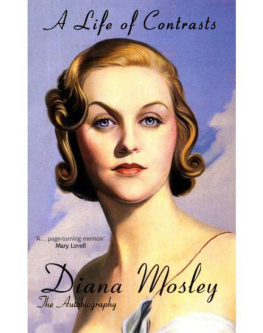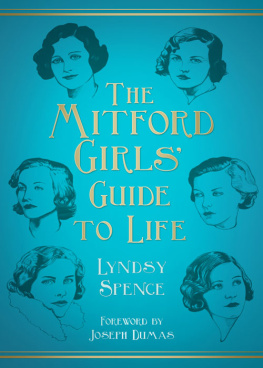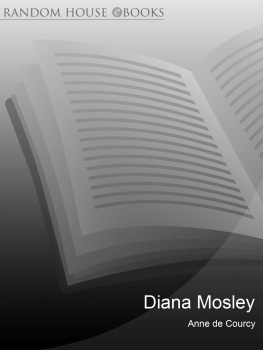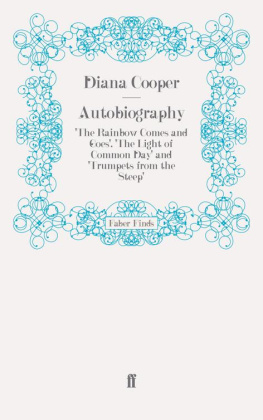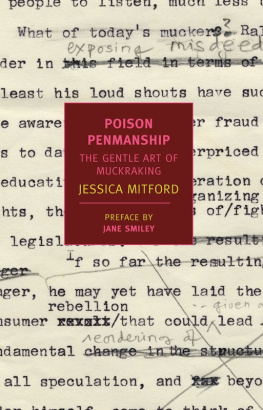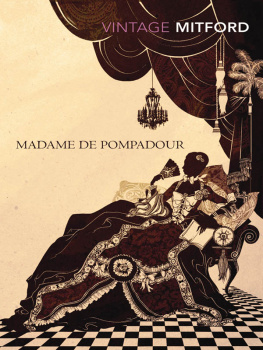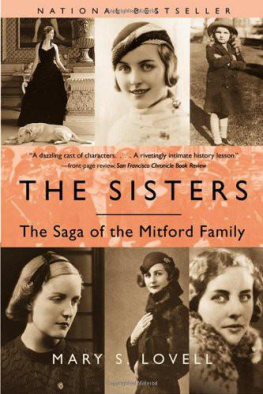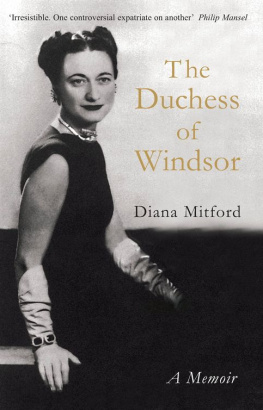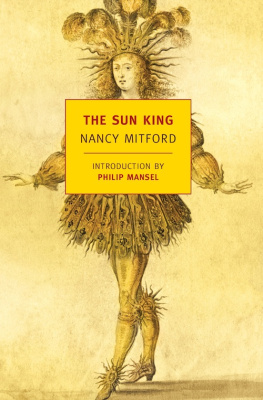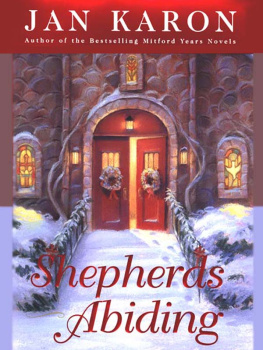Diana Mitford - A Life of Contrasts: The Autobiography
Here you can read online Diana Mitford - A Life of Contrasts: The Autobiography full text of the book (entire story) in english for free. Download pdf and epub, get meaning, cover and reviews about this ebook. year: 2012, publisher: Gibson Square, genre: Non-fiction / History. Description of the work, (preface) as well as reviews are available. Best literature library LitArk.com created for fans of good reading and offers a wide selection of genres:
Romance novel
Science fiction
Adventure
Detective
Science
History
Home and family
Prose
Art
Politics
Computer
Non-fiction
Religion
Business
Children
Humor
Choose a favorite category and find really read worthwhile books. Enjoy immersion in the world of imagination, feel the emotions of the characters or learn something new for yourself, make an fascinating discovery.
- Book:A Life of Contrasts: The Autobiography
- Author:
- Publisher:Gibson Square
- Genre:
- Year:2012
- Rating:3 / 5
- Favourites:Add to favourites
- Your mark:
- 60
- 1
- 2
- 3
- 4
- 5
A Life of Contrasts: The Autobiography: summary, description and annotation
We offer to read an annotation, description, summary or preface (depends on what the author of the book "A Life of Contrasts: The Autobiography" wrote himself). If you haven't found the necessary information about the book — write in the comments, we will try to find it.
A Life of Contrasts: The Autobiography — read online for free the complete book (whole text) full work
Below is the text of the book, divided by pages. System saving the place of the last page read, allows you to conveniently read the book "A Life of Contrasts: The Autobiography" online for free, without having to search again every time where you left off. Put a bookmark, and you can go to the page where you finished reading at any time.
Font size:
Interval:
Bookmark:
Beautifully written.
Valerie Grove, The Times
Martini-dry wit.
Irish Times
Often pure Wodehouse.
Financial Times
Uncompromising.
A.N. Wilson, Sunday Telegraph
It has all her charm.
Laura Thompson, A Good Read, BBC Radio 4
Brilliant.
Evening Standard
A Life of Contrasts is a candid, page-turning memoir, written by a woman who willwithout any doubtbe viewed by history as one of the most fascinating personalities of the Twentieth Century.
Mary S. Lovell
Lady Mosley writes extremely well Her book reads like brilliant talk; her characters live and die in a single phrase An autobiography of real distinction.
Jonathan Raban, Sunday Times
I envy any reader coming for the first time to A Life of Contrasts, Diana Mosleys account of her own eventful past, for he has a rare treat in front of him.
Selina Hastings
Sharp, amusing and well-written.
Hugh Thomas, New Statesman
Wholly if grittily, a Mitford book the reader will be flung between delight and dismay as he reads on To all those not averse to a little powdered glass in their Bombe Surprise: enjoy.
The Times
Other members of the Mitford family do not have the monopoly of brilliant and amusing writing.
The Tatler
She emerges among all else as feminine
Mary Warnock, The Listener
Animated and revealing.
Hibernia
Witty and amusing.
Catholic Herald
She was clearly a star.
Anne de Courcy in The Viceroys Daughters
THE
AUTOBIOGRAPHY
OF
Diana Mosley
G IBSON S QUARE
London
I first met Diana Mosley when in 1980 I was sent by a newspaper to interview her about her book on the Duchess of Windsor. Her husband, Sir Oswald, was alive then, and the Mosleys were living in their ravishing early 19th-century house, Le Temple de la Gloire, just outside Paris. For me it was a memorable encounter, and I was bowled over by this extraordinary woman, not only by the celebrated beauty, formidable intelligence and blazing instinct for the truth, but by the fact that during the three or four hours we spent together she made me laugh almost more than I had ever done.
Diana was then in her sixties, but her exceptional qualities were apparent from an early age. In 1929, when she was just 19, Evelyn Waugh wrote to the novelist Henry Green, Do you and Dig share my admiration for Diana? She seems to me the one encouraging figure in this generation. At that period it was Diana of all the six remarkable Mitford sisters who was most prominently in the public eye, her elder sister Nancy not yet having written the novels which made her name, her younger sisters, Unity, Decca and Debo, still enclosed in the schoolroom. At 18 Diana had married Bryan Guinness, a gentle, literary young man of romantic good looks and an immense fortune, and it was through this marriage that Diana was released into the world to which she ardently aspired, that of the literary and artistic intelligentsia.
Young Mrs Guinness with her loveliness, her wit and her engaging enthusiasm, made friends everywhere, and not only among her youthful contemporaries: Lytton Strachey adored her, as did Augustus John, Gerald Berners and Osbert Sitwell. With Bryans riches at her disposal, Diana filled their country house, Biddesden in Wiltshire, with paintings by artists both new and established, commissioned a carpet from the modernist Marion Dorn, and sculpture from Stephen Tomlin. Dora Carrington painted a trompe loeil and Boris Anrep executed a mosaic for the swimming-pool. (Anreps mosaic portrait of Diana, as one of the nine Muses, still adorns the entrance of the National Gallery in London.)
At Biddesden, in London, and at the Guinnesses house in Ireland, Bryan and Diana entertained and with panache, among the most regular beneficiaries of their lavish hospitality the Sitwells, Henry and Pansy Lamb, Henry Yorke (Henry Green), Robert Byron, Harold and William Acton, John Betjeman and Evelyn Waugh. Betjeman wrote a poem beginning, I too could be arty, I too could get on/ With Sickert, the Guinnesses, Gertler and John, while Waugh dedicated two books to Bryan and Diana Guinness and used Diana as a model for Lucy Simmonds, the heroine of Work Suspended. To Lucy Simmonds is attributed generosity, an unaffected goodness and sincerity, and a pale beauty which rang through the room like a peal of bells.
To Diana the most revered member of the older generation was Lytton Stracheynicknamed Mr Oh-Indeed, as those were the words with which he most frequently punctuated his conversation. It was Strachey who became her mentor, directing her reading and doing a great deal to fill in the gaps left by a somewhat patchy education. She loved him not only for his wisdom and originality but for his unerring ability to see the comic side, as she puts it, a virtue prized almost above all others in Mitford eyes. For as a family Diana and her sisters regard it as an essential politeness to present life, wherever possible, as delightful and amusing, and thus seeing the comic side constitutes a basic requirement of this courteous philosophy.
Wit and humour are notoriously difficult to convey in retrospect, especially here without the advantage of the Mitford drawl and familiarity with the Mitford habit of oblique approach. (An example of this unconventional perspective occured when in 1981 I visited Diana in hospital in London where she was recovering from a life-threatening operation. Laying aside my proffered copies of Tatler and Vogue, she asked me instead to bring her from the London Library two dusty tomes in German Schrift of the life of the Kaiser. How could you bear to wade through such boring stuff? I asked her. Oh, darling, came the reply, the jokes!) But if regrettably I am unable to remember exactly what was said, I know that I came away enchanted from that first meeting nearly a quarter of a century ago, and the warm and stimulating friendship that developed remains one of the delights of my life.
I envy any reader coming for the first time to A Life of Contrasts, Dianas own account of her eventful past, for he has a rare treat in front of him.
Selina Hastings
Neither of my grandfathers had a conventional Victorian family upbringing. Algernon Bertram Mitford, youngest of three sons, was born in 1837, and not long afterwards his mother, Lady Georgina Ashburnham, ran away from his father, Henry Mitford, and went to live with Francis Molyneux whom she subsequently married.
Bertram was sent to Eton at the age of eight. He had been there some years when his first cousin and exact contemporary Algernon Charles Swinburne joined him. He mentions this in his Memories, adding that the aureole of golden hair ascribed to the poet as a boy was really ordinary red. One detects a certain irritation in his references to Swinburne, probably because of the fame of his remarkable cousin and also because of his doubtful reputation and eccentric behaviour. Grandfather was very conventional.
After school and Oxford, Bertram Mitford joined the Diplomatic service and served in Russia and the Far East. He fell in love with Japan, which when he was there en poste was just emerging from its centuries-old isolation; he saw a medieval Japan hardly changed since the days of Lady Murasaki which was thenceforward quickly to disappear. A notable linguist who could speak both Chinese and Japanese, he translated a number of Japanese legends and stories; his Tales of Old Japan was a success and was reprinted several times.
When he was thirty-seven he married Lady Clementine Ogilvy; they had nine children. Their eldest son was killed in the First World War, and when Grandfather died in 1916 my father inherited.
Font size:
Interval:
Bookmark:
Similar books «A Life of Contrasts: The Autobiography»
Look at similar books to A Life of Contrasts: The Autobiography. We have selected literature similar in name and meaning in the hope of providing readers with more options to find new, interesting, not yet read works.
Discussion, reviews of the book A Life of Contrasts: The Autobiography and just readers' own opinions. Leave your comments, write what you think about the work, its meaning or the main characters. Specify what exactly you liked and what you didn't like, and why you think so.

